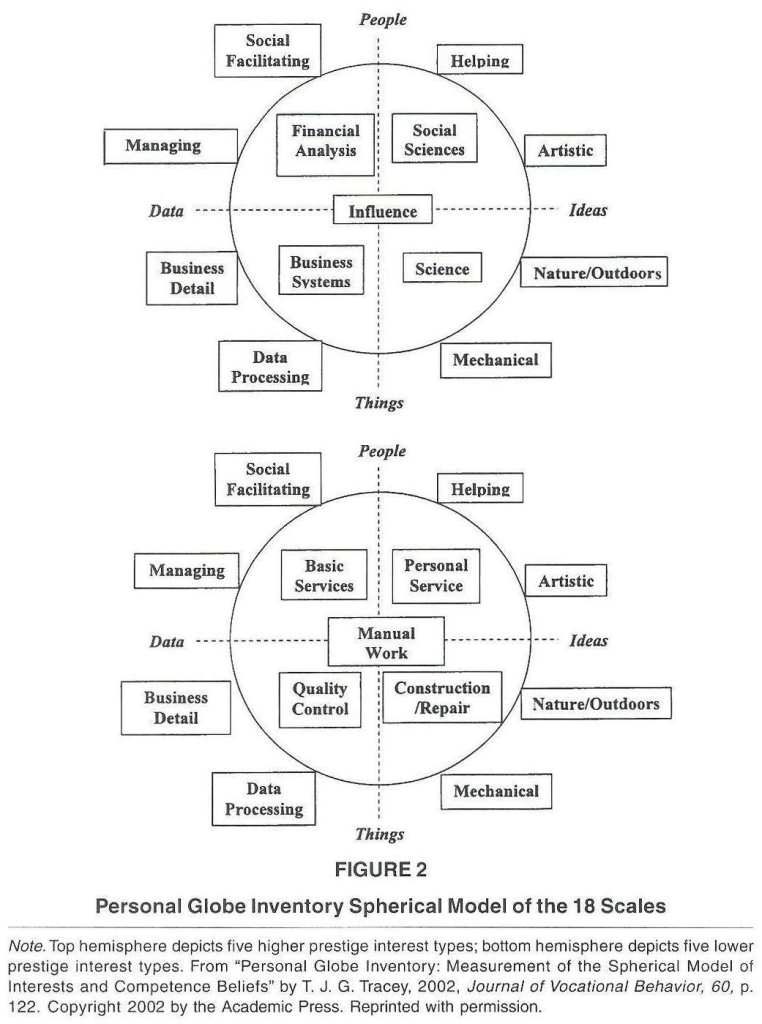The Personal Globe Inventory (PGI), a comprehensive career instrument, has a few official versions. They’re called the the PGI-S (Short) and Inventory of Children’s Activities (ICA).
It’s the younger, less flashy version of the Holland Codes or RIASEC. Yet it packs a punch in the world of career development. The PGI fills in the gaps of previous hexagonal models.
The original was conceptualized in 2002 by Tracey from Arizona State University, and has 108 occupational titles paired with 18 areas of interest.
Respondents use a standard 5-option likert scale from Strongly Dislike to Strongly Like when they answer the career questionnaire. The resulting list of vocational suggestions link to O*NET.

If this looks similar to the RIASEC hexagon, it’s because it extends upon the original 6 General Occupational Themes (GOTs) in the 90s to include more relevant information.
The PGI also take into account Prediger’s 4 poles (Things, People, Data, and Ideas) as two 2-D scales. Overall, there are 31 composite scales.
This is loosely comparable to the DISC communication types as well, where the D-types and C-types are more focused on tasks, whereas I-types and S-types are on people.
Final reports with the Personal Globe Inventory also include a long list of similar occupations in descending order. (Many more than the Strong Interest Inventory, for comparison.)
History of the Personal Globe Inventory
The PGI was established in 2002, and has gone through numerous revisions since then. There are two ways of administration:
- MS-DOS self-scoring computer program
- Paper-and-pencil format
What Counts as High or Low Prestige?
High prestige careers in the PGI are overwhelmingly linked with the Managing, Financial Analysis, and Business Systems themes (Enterprising in the Holland Codes).
In contrast, low prestige is associated with jobs involved with Personal Services, Quality Control, and Construction/Repair areas (Holland Code equivalent Realistic).
Here are some sample titles for high prestige careers:
- Business Analyst
- Doctor
- Lawyer
- Computer Analyst
- Scientist
- Professor
And titles for low prestige careers:
- Administrative Clerk
- Hairdresser
- Construction Worker
- Food Preparation Worker
- Cleaner
- Dispatcher
Is Career Prestige an Outdated Concept?
What makes a career prestigious? Is it the lucrative salary, or the years of studying and training required to secure a position? Is how much command you have over others?
Is it the frequency of interaction with people of status, fame, recognition by the public, or the flexibility to make decisions without an authority figure?
Prestige, it turns out, is quite a global concept. What makes a job prestigious in the US is extremely similar to that in the UK and Brazil. Advanced skills, economic stability, and high earning potential.
The concept of prestige only exists with a loyal supporter base—be it business tycoons, government officials, or professors from prestigious colleges and universities. Outward approval and desire.
Final Thoughts on the Personal Globe Inventory
The PGI captures areas of career interest that the Holland Codes may have missed. Interests alone only account for a piece of the greater vocational puzzle. We have to look deeper into how people thrive at work.
Work styles and prestige are also important factors in selecting a job. The Personal Globe Inventory may have some obsolete concepts on what counts as a high-level or low-level career, especially with the emergence of the gig and creator economy.
In the 21st century, many people now wear a variety of hats when it comes to their work responsibilities. The ‘slash’ career approach has been popular since the boom of online learning platforms—where people can teach themselves skills at their own pace.
Will the Holland Codes go through a thorough revision anytime soon that includes factors from the Personal Globe Inventory? Or will predictive technology overtake the career guidance process?
References
https://stelar.edc.org/instruments/personal-globe-inventory-pgi
Binder, Amy & Davis, Daniel & Bloom, Nick. (2015). Career Funneling: How Elite Students Learn to Define and Desire ”Prestigious” Jobs. Sociology of Education. 89. https://doi.org/10.1177/0038040715610883.
Etzel, Julian & Nagy, Gabriel. (2019). Evaluation of the Dimensions of the Spherical Model of Vocational Interests in the Long and Short Version of the Personal Globe Inventory. Journal of Vocational Behavior. 112. https://doi.org/10.1016/j.jvb.2019.01.003.
Holtrop, Djurre & Born, Marise & de Vries, Reinout. (2017). Perceptions of Vocational Interest: Self- and Other-Reports in Student–Parent Dyads. Journal of Career Assessment. 26. 106907271769274. https://doi.org/10.1177/1069072717692745.
Sodano, Sandro & Tracey, Terence. (2008). Prestige in interest activity assessment. Journal of Vocational Behavior. 73. 310-317. https://doi.org/10.1016/j.jvb.2008.07.002.
Sodano, Sandro. (2011). Integrating work and basic values into the Spherical Model of Interests. Journal of Vocational Behavior – J VOCAT BEHAV. 78. 1-10. https://doi.org/10.1016/j.jvb.2010.09.004.
Tracey, Terence. (2002). Personal Globe Inventory: Measurement of the Spherical Model of Interests and Competence Beliefs. Journal of Vocational Behavior. 60. 113-172. https://doi.org/10.1006/jvbe.2001.1817.
Tracey, Terence. (2010). Development of an abbreviated Personal Globe Inventory using item response theory: The PGI-Short. Journal of Vocational Behavior. 76. 1-15. https://doi.org/10.1016/j.jvb.2009.06.007.
Tracey, T. J. G. (2021). PGI. Personal Globe Inventory [Test description, manual, questionnaires PGI-Activities, PGI-Occupations, PGI-Short, PGI-Mini, scoring PGI/PGI-Short/PGI-Mini, and case examples]. In Leibniz Institute for Psychology (ZPID) (Ed.), Open Test Archive. Trier: ZPID.
https://doi.org/10.23668/psycharchives.4545.
